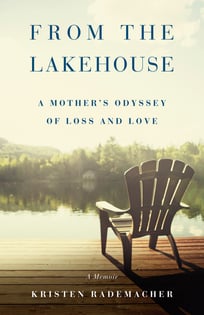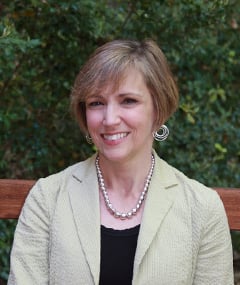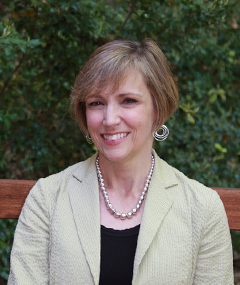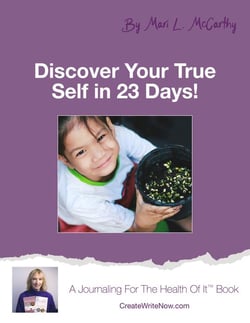A week after my daughter was born still, a childhood friend gifted me with a new journal. Inside its front cover, she inscribed a message: "A place for your feelings when they begin to flow."
And flow they did.
I had always kept journals, but not until my baby girl unexpectedly died had journaling become an imperative. I needed to write, and write, and write, and doing so was a reliable way to comfort myself.
What was it about journaling that provided relief?
I needed a place to 'say' what happened. Losing a baby is wrenching. It was in a hospital triage room, in my 41st week of pregnancy, where I'd discovered that my daughter died. This happened over 16 years ago. In the weeks and months that followed, I'm sure I was in shock and would not have been able to put words to my feelings and then speak them aloud. Even if I'd wanted to. For instance, I remember lying in that triage room after receiving the shattering news that my baby’s heart inexplicably stopped beating. And then I remember the momentary disbelief that I would still go forward with labor and delivery. I was too numb to utter that thought to anyone. But the thought stayed with me, and somehow I needed to share it. Like anyone who's suffered a trauma, I needed to get thoughts like these out. I needed a witness, and my journal was it.
I understood almost immediately after my baby's death that infant loss is not a topic of discussion for the faint of heart. A huge thing had happened to me, but who was hardy enough to listen to the full ordeal? In a way, I protected friends and family from the depth of my sorrow, but I didn't need to with my journal. The blank pages were an invitation for me to lay bare my despair, and they didn't flinch.
My journal was also the place where I started writing letters to my daughter. At first, I felt oddly self-conscious with this practice; I had no experience with writing in such a manner, and no model to follow. Plus, what could I say to my child who never took a breath of her own and never felt the sunshine on her face? Should I write to her as if she were a spirit? Should I apologize that my body did not keep her safe? Doctors had told me that for most stillbirths, the cause of death is never determined. True, in my case. Regardless, I felt responsible that perhaps my body failed her in the eleventh hour.
My initial hesitation about filling my journal with messages to my daughter waned, and letters accumulated. Sometimes I would write to her about what was happening in my life:
Work was hard today. I couldn't focus. Sometimes I just run out of energy going through the motions of talking to colleagues, reading email, and sitting in meetings. Grief is exhausting, as everybody says.
Sometimes I wrote about what she'd be experiencing if she were with me:
I wish you could have been on the hike today. The air was crisp, and the sky was perfectly blue. Spring is in full bloom. You would love seeing the burst of bright pink peonies, and the delicate ivory flowers on the dogwoods. If you could only hear the birds this time of year. Each morning is a chorus of chirps and cheeps.
Sometimes I wrote about how I imagined her:
You would be nine months old today. I bet you would have wisps of fine, flaxen hair coming in, and teeth poking through your gums. You would be crawling everywhere by now, and I would laugh at all your funny little antics.
And so my journal became the place where I cultivated an alternative relationship with my daughter. And on days when I didn't quite know what to write, sitting with my journal in my lap was comfort enough.
Months passed with my journal at my side. The art of habitual writing would periodically lift me out of the day-to-day minutiae and give me a larger view of myself. By putting pen to paper, my interior life spilled out before my eyes and I was able to see subtle changes. Like how often I wrote about feeling peaceful when walking in the woods. My journal provided a record—a collection of personal data—that spending time outdoors was restorative, so I learned to take myself for a hike when my heart was tender and sore.
By tracking my experiences of loss in my journal, I recognized the connection I had to bereaved mothers everywhere. Or really, to anyone who'd mourned a loss. Writing about my own grief somehow revealed the reality that eventually, we all swim in the river of sorrow. Understanding this truth—that to be human is to know heartache—could cut through moments of cold loneliness. I was experiencing the full range of human emotions, even the difficult ones, and saw that I would be in good company forever in doing so. Glimpses of insight like these, born within the pages of my journal, were like a soothing balm, a respite from the hard work of grief.
Eighteen months after my baby's death, the ground beneath my feet had steadied, but I was at a crossroads. My partner and I had split up, and at age 40, I was newly single and accepted that I would go forward in my life without children. At the same time, I'd discovered that my local arts center was offering a journal writing class. Its description seemed perfect: Write Your Way to a Deeper Understanding of Yourself. I suspected that by continuing to dive into my journal practice, especially while at the threshold of a big transition, more insight awaited me. I enrolled.
While the timing of the class seemed perfect, it was meaningful in another way. I'd read many books in the early months after my daughter died, including Losing Malcolm by Carol Henderson—a memoir about a new mother coping with her infant son's death. Either through fate, or synchronicity, or plain old dumb luck, it turned out that Henderson was the instructor of the journaling class. She and I lived a few miles apart? I had no idea before I’d seen her name listed in the course catalog.
The eight-week course led to an invitation to join a new writing group Henderson was leading. We gathered in her living room each Tuesday evening and gave each other feedback on our personal writing projects. I honed my skills drafting essays on all sorts of topics. Eventually, five women and I became steady and dedicated members of Henderson's Tuesday evening group, and we stayed together for years. In the company of these talented writers—who also became dear friends—I began to write essays about my loss. In earnest. For an audience. I mined my journal for details. Week after week, month after month, the essays morphed into a personal narrative, and the beginnings of a memoir began to take shape. Many drafts and over a decade later, I completed a final book.
My memoir, From the Lake House: A Mother's Odyssey of Loss and Love, was born from my journal, the  repository of raw emotions and reactions as I walked the road of grief and healing. In many ways, journaling was a saving grace, a ritual that provided me comfort and peace when I needed it most. But the journaling class I signed up for on an impulse propelled my life into new directions. Through it, I'd stumbled into an entirely new world. Before joining Henderson's group, I had no vision of myself as an author, and I hadn't set out to write a memoir. And yet . . . I am, and I did.
repository of raw emotions and reactions as I walked the road of grief and healing. In many ways, journaling was a saving grace, a ritual that provided me comfort and peace when I needed it most. But the journaling class I signed up for on an impulse propelled my life into new directions. Through it, I'd stumbled into an entirely new world. Before joining Henderson's group, I had no vision of myself as an author, and I hadn't set out to write a memoir. And yet . . . I am, and I did.

Author bio: Kristen Rademacher has lived in Chapel Hill, North Carolina since 2002, which is when she began writing. From The Lake House: A Mother’s Odyssey of Loss and Loveis her first memoir and is available on July 21st on She Writes Press. With a Master’s Degree in Education and a Professional Coaching Certification, Kristen is an Academic Coach and ADHD Specialist at the University of North Carolina at Chapel Hill. She also leads trainings and presentations at national conferences on the topic of academic coaching. Visit her at kristenrademacher.com, and on Facebook @kristenrademacherauthor
NOW ON SALE!



Leave Comment